#footnote 72
Text
Call him “Epstein” – How far is Mark Lewisohn willing to go to force a false narrative?
“I don’t care what you think of Klein, call Klein something else. Call him ‘Epstein’ for now, and just consider the fact that three of us chose ‘Epstein.’”
John Lennon to Jann Wenner, Rolling Stone, May 14, 1970

I keep asking “Why do you want me to believe John —(or George or Paul or or or)—said this?” And I keep asking because that is the question that keeps coming out of my mind, my mouth, and my keyboard.
It's the obvious question. (Spoiler: audio below of Lewisohn answering it for this quote.)
When you’re going to so much trouble to quote shop and quote twist, you have a purpose that you are torturing all these words to back up. You are trying to prove a point and there’s no real quote to support your position, so instead of changing your position, you act like Beatles’ words are appetizers in a buffet.
THREE OF US CHOSE EPSTEIN.
This premeditated and purposeful OBSCENITY has been sitting there for ten years. Two ladies with a podcast found it.
However, John remembered Paul’s attitude to Brian being very different. John was always emphatic that Paul didn’t want Brian as the Beatles’ manager and presented obstacles to destabilize him, to make his job difficult … like turning up late for meetings. “Three of us chose Epstein. Paul used to sulk and God knows what … [Paul] wasn’t that keen [on Brian]—he’s more conservative, the way he approaches things. He even says that: it’s nothing he denies.”(72)
I will never—NEVER— get over this one. There may be more shocking things to come, but it was this revelation that made me look at every one of Mark Lewisohn’s “author interviews” differently.
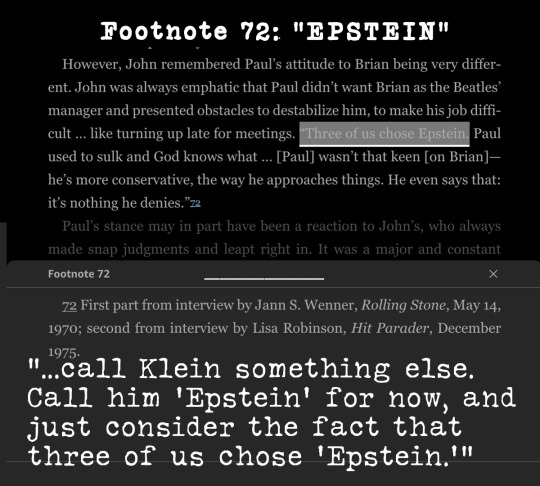
This is when I realized that there is nothing I would put past him.
Listening to that part of Episode 7 is so funny to me now. Daphne and Phoebe kept trying to stick to the outline and ask “Does this quote back up Lewisohn’s thesis?” but it was very difficult because they were in such total disbelief at Mark Lewisohn’s deception. (My label, although it’s a pretty inarguable one.) It is genuinely almost unbelievably dishonest. AKOM had a whole show filled with whoppers to get through, and they kept trying, but it took them awhile to move on because air-quotes-Epstein was like a magnet that kept pulling them back. So yesterday, to get out of editing some of my own mess, I put together a few of the times that the shock sucked them back in.
“I find that kind of shocking, really.” Tiny compilation of Phoebe and Daphne in disbelief over Mark Lewisohn’s purposeful misrepresentation of a quote of John Lennon talking about Allen Klein to attempt to show that John thought Paul was trying to thwart Brian Epstein. (Episode 7)
And most of us strongly suspect where Mark Lewisohn is going with this. He wants to rehabilitate Allen Klein because John can literally never be wrong—or perhaps an even stronger motive—he wants Paul to be very, very wrong. But whatever his motives, we can see what he’s doing. And we don’t have to just suspect, because he has already told us that he is going to use some of his most unforgivable lies to shape that narrative.
And there’s only one reason to do that: because there are no real quotes to back up the narrative he wants to push.
It tells us, in no uncertain terms, that the narrative he wants to push is quite literally unsupportable.
To make it work, Lewisohn has to lie about what John Lennon actually said.
*This post was first going to be about both the “quotes” that Mark Lewisohn references here, but in the end I couldn’t not give “call him ‘Epstein'” its own post. Which means I have actually shortened a post. (Please clap.)
Every ‘quote’ in the “spanner in the works” section is bullshit. Every. Single. One. I’m not going to the thesaurus for a fancier word. They are bullshit. Complete and utter, doctored, twisted, bullshit. The man is lying. And what really chaps my ass is that he is flat out telling us that he is going to use those same lies to push his bullshit narrative of the breakup. Like damn, that takes a lot of nerve.
Here is Mark Lewisohn telling us, straight out, that it’s these same bullshit quotes that he plans on using again to fool us. And he should be a laughingstock when he does. Not in some quarters. In all.
He must think we are such dupes. Although he’s gotten away with it so far, so up until now he hasn’t been wrong.
(There’s a bit more to this part of the Q & A and it’s all bad, but for this post I decided to leave it at Mark Lewisohn telling us that he is going to use the exact same sources he used for the “spanner” section to push this lie in the upcoming books.)
Fool me twice…
Would John and George have seen the parallel between Epstein and Klein in 1969? LEWISOHN: ❝Yes. I’m sure the answer to that is yes, because John mentioned it in interviews, probably in Wenner’s, maybe the one with McCabe and Sconfeld— Schonfeld. Yes.❞ (📍Nothing is Real)
Transcript:
Q. In Hornsey Road you were talking about the three-to-one Allen Klein split, and I was saying to you that it seemed to me that it paralleled what is mentioned in Tune In about, uh, the appointment of Brian Epstein. That- that Paul was sort of holding back or was not keen to move forward with Brian Epstein. And I suppose my question was, is there a direct parallel there? And would, in 1969, John and George in particular have been conscious of that parallel?
LEWISOHN: Yes. I’m sure the answer to that is yes, because John mentioned it in interviews, probably in Wenner’s, maybe the one with McCabe and Sconfeld– Schonfeld. Yes. John recognized that.
Nothing is Real Podcast • October 16, 2019, Episode 15 • Mark Lewisohn, Part II
---
And just remember that this is only one half of a hellacious Frankenquote.
(But I kept it short. 🎊 )
----
Even though I have given you zero reason to go there, it's also on my blog.
#the beatles#mark lewisohn#akom#fine tuning#tune in#beatles#historiography#brian epstein#allen klein#john lennon#paul mccartney#air-quotes-epstein#footnote 72#spanner in the works#lewisohn#call him “epstein”#Spotify
51 notes
·
View notes
Text
TWI volume 10 spoilers ahead (minor, non-main story/side chapter, not major plot point or anything at all)
Ok so it was a couple chapters ago now, but can I just mention how well the Hedault thing was tackled (at least in my opinion)
He practically comes out as aroace, or well, at least aro and like ahxownfowbfowb
He says that his lack of romance and that pesky sexual attraction doesn’t take anything from his life, but enriches it, lets him truly focus on what he burns for.
Pirateaba did this scene wonderfully. Especially when another conclusion some people would have made, him being gay, is explicitly denied. They literally say (I don’t remember whom) “it’s okay to like men” (not verbatim) and he says that it’s not it.
This is the kind of representation that we (at least I) want, it says what it is, doesn’t feel the need to use terminology, which frankly wouldn’t exist for an identity that even our world, lesser and younger it may be, only was thought of to exist quite recently in the grand scheme of things.
It denies the “oh, not straight, let’s ship them gay then”
It says “putting this character in a relationship is the same as putting a canonically solely gay character in a straight relationship” in my mind. Even though that might not be the actual meaning of it I want to feel that way, for however much it may be worth.
A lot of our rep, (the stuff that is explicitly stated or implied and everything and whatever) is often just glanced over and people say “oh yeah, they’re gay now.” Yes you’re entitled to your ships, yes ships often just explore character dynamics (perhaps), but when you have so little, even in queer media, you start grasping at the little straws, even as they’re taken out of your hands by your bigger more well known and accomplished sibling.
#twi#the wandering inn#aroace#ace#aro#rant#shipping?#ace representation#ace rep#aro rep#aromantic representation#asexual#whatever other tags would fit here. I’m bad at these.#text post#i love this series so much#I like my parentheses too much. I would really like a way to make it feel like reading the side notes at the same time as the actual text#like the Baertimeus series or something. 72 that series is fun to read on a kindle/reading tablet (the footnotes are amazing)#oh maybe#literature#would fit here#and also#web serial#web series
18 notes
·
View notes
Text
House of Leaves, Chapter 5
Why is there the most effectual, heartfelt literary analyses of Echo in my spooky house book? I know why its here, I'll get to that in a bit, but can I just talk about how empowering Zampanò's view¹ of Echo is? Painting her as an insurgent, working against her curse of repetition as best she can, to give those words her own life and sorrow. I don't care if it's the point of the book or not, being able to read this bit was kind of a treat. Like I was reading a proper dissertation on the mythical nymph. The various call and answers given are also fun bits or literature and curiosity.
Echo as something comforting, as something human and whole and most especially, emotive, is a really strong point for the horror inherent to the house. What's scarier than a well that takes a long time to hear the echo from? One where you can't, of course. Vastness, once again, reigns over the story. And it makes sense so much time was spent here since Zampano is blind. Echo is his sight, no wonder he has such an opinion on this line² purportedly penned by Miguel de Cervantes and echoed by Pierre Menard. There is something there only he can see so feelingly.
Or... is there? I wonder if I might be following in Johnny's steps a bit too much, taking this fake story about a fake movie with fake references too much at face value. Trying to untangle it and becoming tangled in it. It might be a good perspective to keep going forward.
Speaking of that asshole³ there is one hell of a footnote by him⁴ with another of his rambling run-ons. I had to read it three times and it gives me a headache trying to make sense of it. Because of its proximity to the line "flung down hallways long past midnight", I'd almost dare to say it was noise for noise's sake.
But then we get to this... Yeah it's an echo. No, it's the absence of one. Johnny's fling with Thumper⁵ ends in silence. It's marked by the absence of things. By that same token, Karen and Will's relationship devolves into quiet as well. An absence of speaking, of the children yelling and playing, of what it already did to Karen at 15⁶. We were introduced to this concept with Echo and now we're bereft of her and I feel it so sharply.
And now the book's format begins to deteriorate. It's slight, it's in these purposeful blanks⁷ and then this impossible clusterfuck of names⁸. And of course it's in time with Will being lost in the Hallway. An excess of useless, nonsensical information my brain wants to make sense or find a patter in. But instead it's just here, obfuscating the flow of the story. I want to call it the impenetrable darkness itself but even I wonder if I'm reading into the formatting too much.
What I do know though, is that Johnny's final interlude about his panic attack⁹ sure echoes his first. It keeps happening, and never when he's near the book. It's always when he's... "not at home".
Sorry, this was a long one but it feels like such a dense chapter. I expect these will get harder as the formatting breaks down.
#live reading#house of leaves#Maeve's House of Leaves Readalong#footnotes#1 - Figuratively speaking#2 - p. 42 footnote 49#3 - Johnny#4 - p. 48-49#5 - p. 54#6 - p. 58 for this last bit about Karen#7 - p. 63#8 - p. 64-67 Christ it's as long as a Johnny interlude#9 - 69-72
1 note
·
View note
Text
Update (April 2024): Since writing this post, I have found part of the audio for this interview, which you can check out here. It's not the full interview, so I haven't been able to check every quote against the original audio - I believe the video compiles the audio clips from this interview that appeared on Elliot Mintz's "The Lost Lennon Tapes" radio show. Citation 36-16 is not in the available audio, but citation 10-9 has been substantially updated.
@mythserene's fantastic exposé “A Beatle Didn’t Say That! Lewisohn’s Lab-Created Quotes” exposed several altered, sewn-together, and otherwise doctored quotes from Mark Lewisohn’s Tune In: The Beatles: All These Years (henceforth Tune In). I already had a less-than-favorable view of Lewisohn’s work after @anotherkindofmindpod's mammoth “Fine Tuning” series, a well-researched, often infuriating, always entertaining series that laid out the overarching bias in Tune In, but there can still be value in a biased work, particularly if you consume it with that bias in mind. Doctoring quotes, on the other hand--for a biography of supposed historical import, that's a capital offense. So how could a big-name author, revered for his rigor and devotion to primary sources, put so many barely-concealed doctored quotes into his work? Why would he do it? And if @mythserene could turn up several as part of an initial investigation, just how many of the quotes in Tune In weren’t actually quotes?
Naturally, I’ve chosen to do the sane thing, and check each of his sources, one by one.
I’ve started with David Sheff’s 1980 Playboy interview of John and Yoko, which Lewisohn cites 19 times in Tune In. Of these nineteen citations, sixteen are in some way altered, many in substantial, meaningful ways. I’m working on a longer post with side-by-side comparisons of all sixteen altered quotes, but that’s taking me aaaages to construct. In the meantime, here are two examples that illustrate some of the common ways Lewisohn alters source material.
A note on sources and notation: My numbering system for Tune In's footnotes is Chapter Number-Endnote Number, with "P" used for the prologue. My comparisons were made using All We Are Saying (David Sheff, 2000, St. Martin's Griffin, 229p). Page numbers are given as Sheff 2000. Lewisohn recommends the version of this book contemporaneously published in the UK by Sidgwick & Jackson as "the best available publication of this Q&A" (P-22). Onwards!
We will start at the end with the quote Lewisohn uses to close out Tune In (36-16). Sheff 2000 (p.72-73) on the top, Lewisohn on the bottom, commentary under a cut.
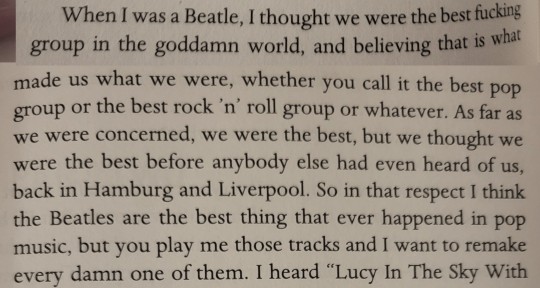

Highlighted in yellow are changes made by Lewisohn; in pink, a phrase of Lewisohn's invention. Hardly his most egregious work, but it demonstrates four common features you'll find in many of his altered quotes. They are:
First: The misleading use of the ellipsis. An ellipsis can be used to indicate text omitted from the original quote, but Lewisohn uses it here where there is no omission. He does the same thing with brackets in other quotes. This is one of the strangest patterns I've found while fact checking, and I can't figure out why he does it. Is it sloppiness? Or is he using notation that looks correct to give his work the semblance of academic credibility while distracting from parts of the quote he's actually changed?
Second: The pointless switcheroo of "the best rock 'n' roll group" and "the best pop group". Lewisohn frequently flips the order of words in a list, phrases in a sentence, or sentences in a larger quoted passage. Frequently, as here, this has no effect on the quote's meaning. It seems arbitrary.
Third: The glib closing line. I've found a few other examples of Lewisohn inventing a closing line to a quote that wraps up the meaning he wants the reader to take from it with a tidy bow. This line feels out of place, doesn't it? It's a little too tidy, a little too cheesy-dialogue-y.
Fourth: The tonal shift. This line comes from a larger exchange in the original interview where John discusses whether the Beatles will get back together, and what their musical legacy is. He seems proud of the Beatles, but he also seems conflicted, jaded, tormented by constant dissatisfaction with his musical/artistic output. Never satisfied. By adding his final line, Lewisohn turns an emotionally complex statement into the victory lap of a has-been, a high school quarterback reflecting on their glory days. It flattens John Lennon, and it's hardly the only example. Which brings us to...
Tune In 10-9 (Updated)


This quote (Sheff 2000 p.182) is from the part of the interview where Sheff runs through the Beatles' catalogue to determine who wrote what. In this section, they tackle "Getting Better," and John candidly discusses his violent nature. He ends with the self-reflective “I will have to be a lot older before I can face in public how I treated women as a youngster.” Lewisohn quotes this line, then adds an additional line that doesn’t appear in All We Are Saying. I assumed Lewisohn had invented this line—that may still be the case, but things are stranger than I initially assumed.
Take a listen to the audio of this exchange at 2:12:10 in the video. Here’s my transcript:
JL: That’s Paul and me. His main lick, but lots of the words and parts and bits from me and possibly the others in the studio. All that [sings] “I used to be cruel to my woman and beat her…” That’s me because I used to be cruel to my woman physically. Any woman, y’know. I was a hitter. I couldn’t express myself, and I hit. I fought men, I hit women. I was violent. That’s why I’m always on about peace, you see, it’s the most violent people who go for love and peace, and I sincerely believe in love and peace, but I am absolutely a violent man who has learned not to be violent and regrets his violence.
[Sheff interrupts] DS: …the chorus or just the idea for it?
JL: Is this Getting Better? Getting Better is his chorus and then both together writing the sort of Chuck Berry-ish sounding, but I know that input about beating was from me and references to school and things like that. [clip ends]
HOO BOY. I’ve bolded the parts that Sheff used, though there are some minor edits/paraphrases compared to the audio even then. But the line, “It’s a diary form of writing”? Not in the audio. “Everything’s the opposite”? Not in the audio. “I will have to be a lot older before I can face in public how I treated women as a youngster”? Yeah, that’s not there either.
This clip doesn't appear to have any pieces cut from the middle. Sheff tries to interrupt John pretty much the entire time, so there isn't much dead air where you could seamlessly chop out a few sentences. This is particularly true where John supposedly says the "youngster" line. What the hell is happening here?
I’ve got two theories. Theory 1: John says the “youngster” quote at another point in the interview, and Sheff added it here. This leaves the possibility that Lewisohn’s “hitting females” quote actually appears before it on the tape.
Theory 2: Sheff made up the “youngster” quote. This is, unfortunately, plausible to me. Listening to the audio, Sheff spends the entire time trying to interrupt John, and eventually succeeds in doing so. He was a man on a mission: he wanted to sort out, on the record, who contributed what to each Beatles song. Then John was killed. Sheff listened to the tapes, and was mortified to hear himself derail John on an extremely sensitive topic. To make things right, he editorialized a bit, added a final, remorseful sentence, something he thinks John may have said had he not been cut off.
I’m not saying it happened, but, imo, it’s plausible. At the least, Sheff added in a real quote from a different part of the interview—this may be a common comorbidity for John Girls™.
The implication of this theory is that Lewisohn quoted something John never actually said, and then added in a further spurious sentence. I wish I could dismiss this as ludicrous, but maybe it’s fake quotes all the way down.
#mark lewisohn#tune in#the beatles#john lennon#i'm sorry this is so long i promise i don't have this much to say about every non-quote#lewi-sins
68 notes
·
View notes
Text
Medicine may be about to achieve a long-sought goal: a “morning-after pill” to prevent sexually transmitted infections. It could sharply reduce soaring rates of illness and huge health care costs.
The effectiveness of this pill—and it literally is a pill, a 200-milligram tablet of the antibiotic doxycycline—has been studied for a decade, and people have taken it covertly for years. But study results published in The New England Journal of Medicine look likely to tip the pill into clinical practice. In the study, conducted in San Francisco and Seattle, participants who took a single dose within 72 hours of having sex without a condom were only a third as likely to contract chlamydia, gonorrhea, or syphilis as those who didn’t take the pills.
As with everything in medicine, there are footnotes to the findings, and risks to balance the benefits. The study was conducted only among gay and bisexual men, along with transgender women and nonbinary people assigned male at birth. Within those groups, it was limited to people who had been diagnosed with a sexually transmitted infection (STI) in the past year. The study didn’t include cisgender women; in past studies, the preventive antibiotic has not worked as well for them. And the study noted, but didn’t explore in depth, the possibility that routinely administering an antibiotic could provoke resistance either among the bacteria that cause STIs or others carried in participants’ bodies.
All that said, the results have created real excitement among physicians and people who would be eligible to take what’s being called doxyPEP (for doxycycline post-exposure prophylaxis)—even though health authorities, such as the US Centers for Disease Control and Prevention, haven’t yet made formal recommendations for its use.
“I think this is a real game-changer,” says Paul Adamson, an infectious disease physician and assistant clinical professor of medicine at the University of California, Los Angeles. “We have a huge amount of bacterial STIs in the US. Gay and bisexual men who have sex with men are disproportionately burdened by them. And we have not had a lot of tools that we can use to help.”
To understand why doxyPEP could be so significant, it’s important to consider what’s been happening with STIs. Briefly: They’re skyrocketing. Since 2017, according to the CDC, the most important of these diseases have reached historic highs: Gonorrhea has increased by 28 percent, and syphilis by 74 percent. And while chlamydia diagnoses haven’t quite returned to their pre-Covid levels, the agency worries that might be due to pandemic disruptions to care, rather than to an actual decrease in transmission. All of those infections have profound long-term consequences if they are not diagnosed and treated, including making people more vulnerable to HIV infection. Collectively, they cost the US health care system more than $1 billion per year.
Meanwhile, congenital syphilis—passed from mother to infant at birth, a sign that the pregnant person never received adequate prenatal care—caused 220 stillbirths and infant deaths in 2021, the last year for which there are national figures. Gonorrhea is gaining resistance to the last antibiotics currently available to treat it.
In medicine, prevention is almost always preferable to treatment: Vaccines and other prophylactic measures are less expensive, and can be planned in advance. So it has been a research goal to find uncomplicated prevention for STIs—something that, like the morning-after pill for pregnancy, can be taken a short time after sex and doesn’t rely on the user making decisions in the moment.
The first test of doxyPEP, a small US trial that took place in 2011 and 2012, was published in 2015, and showed that HIV-positive men who took the post-exposure dose cut their rate of STIs by three-fourths. Fairly soon after that, social networks of men who have sex with men picked up on the findings, and began sharing knowledge about using preventive doxycycline off-label. A large 2017 French study of men using pre-exposure prophylaxis for HIV, known as PrEP, included within it a study of STI rates among men taking post-exposure doxycycline; it showed that doxyPEP could cut rates of syphilis and chlamydia infection by almost 70 percent. And last summer and this spring, the two largest international HIV conferences included presentations that confirmed the doses were successful in most circumstances.
Several of those presentations were drawn from the San Francisco and Seattle study just published in NEJM. Its results were so dramatic that the authors stopped the trial earlier than planned, in May 2022: They revealed that, among 501 men who were either living with HIV or taking HIV PrEP, consuming that single dose of doxycycline within 72 hours of sex without a condom reduced the combined incidence of the three major STIs by roughly two-thirds.
“Our goal was to understand this in a real-world setting, in a heterogeneous population of people taking HIV PrEP but also living with HIV—which biologically aren’t different populations, but may be different in terms of sexual behaviors, sexual networks,” says Anne Luetkemeyer, one of the study’s principal investigators and a professor of medicine at the University of California, San Francisco. Combined with the French research, she adds, “we now have two studies that really showed very remarkably similar efficacy in this population.”
Those two sets of results may be enough to let doxyPEP enter mainstream medicine. In some places, it already has. Last October, San Francisco’s public health department became the first local department to support doxyPEP use in its jurisdiction. And after the NEJM paper, individual physicians tweeted they would begin prescribing doxyPEP because the results looked so solid—something they can do off-label because the Food and Drug Administration already approved the drug decades ago to treat a range of infections.
When a new way of controlling a disease seems likely to enter the US mainstream, the CDC is expected to weigh in. So far, the agency hasn’t published official guidelines regarding the use of doxyPEP. Following the release of preliminary data at conferences, the CDC published “considerations for individuals and healthcare providers,” a strategy for sharing what’s known so far, as well as an acknowledgment that doxyPEP already is being used off-label. A CDC spokesperson told WIRED by email that formal draft guidance for physicians could come “by the end of the summer.”
When that guidance does arrive, it isn’t expected to recommend doxyPEP for everyone. “We should consider offering this to people who have an elevated risk” of STIs, Luetkemeyer says. “And that group is men who have sex with men, on PrEP, or living with HIV, who've had a history of STIs. I think that's a reasonable group.”
And eligible people may not want to take it. Like almost all antibiotics, doxycycline has side effects: sun sensitivity, diarrhea, serious nausea. And it hasn’t worked equally well for everyone. In the trial done in French men, the antibiotic did not suppress gonorrhea infections, even though it had a dramatic effect on reducing syphilis and chlamydia. In the one trial done so far among cis women, launched in Kenya in 2021, doxycycline prophylaxis (known in this case as dPEP) had no effect on suppressing STIs.
That was disappointing; women who are at high risk of STIs need prevention as much as men do. Equally, it was mystifying for the researchers, who now are poring through their data to see what might have made a difference: whether the 449 participants had difficulty taking the drug at the right time, for instance, or whether doxycycline behaves differently in female organs than in men’s. “We had more than 200 women show up to hear the results, and they were so shocked and disappointed,” says Jenell Stewart, the study director and a physician-scientist and assistant professor at Hennepin Healthcare in Minneapolis. “We are very focused on understanding these results before we say this doesn’t work for women.”
One thing that might have played a role in Kenya and France—and is raising red flags for doxyPEP use in the US—is antibiotic resistance. Stewart says 100 percent of the gonorrhea isolates tested so far from women who became infected while on dPEP showed high levels of resistance to tetracycline, the drug family that doxycycline belongs to; at the time of the French study, the background rate of resistance in gonorrhea there was 56 percent. In the US, where doxycycline isn’t the first-line treatment for gonorrhea, the rate of resistance is only 20 percent. That may provide a clue to why doxyPEP worked better in the US trial than in any other. But it also immediately raises the concern that if doxyPEP goes into wide use, it might make resistance worse.
The US study could not provide an answer: Though some men in the trial did contract gonorrhea while taking doxyPEP, not enough testing was done to confirm whether their strains were resistant to the medication and thus not knocked out by the single dose. Tests did suggest the drug might be affecting other bacteria in participants’ bodies, but the results were contradictory. Those taking doxyPEP ended up harboring 40 percent less staph bacteria—something that all of us carry—than those not taking the drug; but the staph they were still carrying showed “modestly higher” resistance. Whether killing some bacteria was more beneficial than making others potentially hazardous, the trial didn’t last long enough to say.
So the calculation inherent in doxyPEP may not be risk versus benefit, as much as it is risk versus risk: preventing an infection while provoking resistance through small doses, or contracting an infection that requires larger doses over a longer period of time. “We’re not comparing doxyPEP to no antibiotics,” says Adamson, who researches drug-resistant gonorrhea and has prescribed doxyPEP for some patients. “We’re comparing doxyPEP to potentially significant amounts of ceftriaxone, or penicillin, or doxycycline perhaps, if somebody’s getting infections a lot.”
It’s a question that research will have to answer—because, no matter how the CDC weighs in, doxyPEP use is moving ahead. Joseph Osmundson, a microbiologist and author in New York City—where STI rates are rising just as they are nationally—recently sought a prescription from his regular physician. As a queer sexual-health activist, he says, it only made sense, not only to prevent infections and antibiotic side effects for himself, but also to keep from increasing infection rates in an already overburdened city.
“When people want an intervention to have a healthier sex life, you cannot not give it to them,” he says. “Withholding the intervention will not prevent people from having the kind of sex that they enjoy. The question is: Are they going to be provided with as many interventions as possible to have that type of sex with less risk of infectious disease?”
110 notes
·
View notes
Note
Unpopular opinion: The narrative favors MARINETTE over everyone else, so get over yourselves if you think Adrien is being coddled or everyone else is not punished enough.
If it seems like she's being blamed for shit she didn't do, that's the narrative forcing the plot to center around her instead of someone else. If she does something that actually warrants punishment like stalking Adrien or leading Luka on, it gets brushed to the side. If she goes out of her way to snoop somewhere she doesn't belong like say, the Agreste Mansion, that's the narrative shoehorning her in instead of giving screentime to characters who needed it more like everyone who was already at the exclusive party (not just Adrien, but Kagami and Chloe too. Them along with Felix were in the same room and it's a waste the narrative didn't do shit with it). Marinette always "learns" the lesson of the day because she's the PROTAGONIST. If someone else were to learn their lesson, that's taking away from Marinette and the show doesn't allow that. If people like Chat Noir or Alya or Fu seem incompetent, it's because they needed to nerf everyone else to make Marinette shine because this is supposed to be her show and Marinette needs to be the most powerful piece in the board. If it seems like Adrien is doing nothing, it's because the show doesn't know what to do with him outside of being Marinette's trophy. He has to be "perfect" if he's gonna be a good prize, so the narrative pretends he is and ignores his less than pleasant sides. His actions ultimately don't matter. He can save the world from a giant pastry and it's just gonna be a footnote in the episode. He can "get away" with shit cause the spotlight refuses to hang around him long enough for it to bite him in the ass. He has no real power within the narrative. Everyone else has even less than him. They matter less than him. It's why the narrative doesnt say shit about your saint Luka for lying to Marinette's face about him knowing her secret identity.
It's always Marinette who has development and agency and power and can make a difference. She's not the martyr you like to paint her as. She has everything, the good, the bad and the ugly.
(The post this anon is referring to)
Okay, I will once again admit that I really phrased my response to that ask in a terrible way, and once again, I apologize for that bad take saying he was worse than Chloe and Lila combined, but I still stand by my claim that the show doesn’t call Adrien out for the things that he does compared to Marinette getting punished or blamed for every little thing she does.
Are you really going to ignore every single terrible thing Adrien has done while acting like Marinette is the real bad guy here? If not, here’s a recap of the things Adrien did in Season 4 alone...
He actively slacked off on his duties and got excited at the idea of someone almost getting akumatized, in addition to disregarding the responsibilities Ladybug now has as Guardian (Lies)
He repeatedly disobeyed orders for petty and selfish reasons (Lies, Sentibubbler, Wishmaker, Strikeback)
He refused to understand the boundaries Ladybug placed regarding their relationship (Glaciator 2)
He almost harmed innocent people, intentionally and unintentionally (Hack-San, Rocketear)
He got himself captured or brainwashed by an Akuma (Mr. Pigeon 72, Mega Lech, Guiltrip, Ephemeral, Penalteam)
He literally gave up being a superhero and left Ladybug to deal with the fallout (Kuro Neko)
He talked shit about her behind her back because he was left out of certain discussions and plans like the identities of the temp heroes, but as soon as she had no other allies, he acted like he always cared about Ladybug’s best interests. Oh yeah, and before that, he even whined about Ladybug not always trusting him WHILE SHE WAS HAVING A FUCKING PANIC ATTACK, FULLY AWARE SHE DIDN’T KNOW HE WAS CAT NOIR. (Strikeback)
And here’s all the stuff Marinette has had to go through in Season 4...
She wasn’t able to enjoy her relationship with Luka thanks to the growing amount of responsibilities in her superhero life (Truth)
She was yelled at by another Guardian who did nothing to actually help her (Furious Fu, Ephemeral)
She was shamed by Mylene for not doing enough to help the environment because I guess saving lives as Ladybug didn’t count (Mega Leech)
She had to deal with nightmares about losing to Shadowmoth (Sentibubbler)
She blamed herself for her mother getting arrested by a bunch of aggressive cops (Qilin)
She was influenced by her Kwami’s severe case of the munchies that she couldn’t control at all (Dearest Family)
She worked herself ragged trying to find a replacement for Cat Noir after being left high and dry by him (Kuro Neko)
And after learning her best friend went behind her back to not lose her boyfriend (Rocketear) she lost all of the Miraculous, and by extension, all of her other allies after being stabbed in the back by someone she thought she could trust while simultaneously being shamed for not trusting people, and need I mention the panic attack again? (Strikeback)
That’s not even getting into the routine stress of always needing to save the day while Cat Noir either slacks off in battle or sacrifices himself on a whim because he thinks her angry face is cute (Lies), or the fact that once she retires as Guardian, she’ll lose all of her memories relating to the Miraculous and her life as Ladybug (Miracle Queen).
After all that, you think Adrien has it harder? Adrien, the person who routinely screws around while lives are at risk, never takes responsibility for his actions, and will threaten to quit if he doesn’t get exactly what he wants, if he isn’t throwing hissy fits first? You think he has it harder than Marinette?
I get I said something stupid about how bad I think Adrien is, but you can’t act like he’s entirely blameless in this situation.
#immaturity of thomas astruc#iota#miraculous ladybug#miraculous ladybug salt#ml salt#adrien agreste#cat noir#chat noir#marinette dupain cheng#ladybug
69 notes
·
View notes
Note
Something that annoys me with how both the show and salt fics prop up Marinette is how it always comes at the expense of nerfing others. No one is allowed to be more capable than her at saving the day, even when it would make perfect sense. Plot always has to be resolved by her and mostly only her.
Chat Noir/Adrien is the most consistent victim of this. Even though he's established to be an accomplished fencer, academically intelligent, a super model, etc.... somehow Marinette is the better fighter, the smarter one, the more professional one. Almost none of his honed skills gets him to shine because he might overshadow Ladybug. Who needs a guy who put in the effort and struggles at getting skills when there's this special girl who can get it right on her first try and never struggled since Origins? Chat Noir could save the world by Cataclysming a giant meteor bread but it would just be a footnote in an episode centered on Ladybug and her akumatized family. If he's shown to have a skill that would be super useful like soccer, he will forget about it. Cause he is not allowed to be the MVP. It always has to be Ladybug. It's for the gurl power tm.
Except not really when we consider Alya. There are episodes which I feel should've let Alya resolve things or contribute more. The one instance that stood out most to me is in Optigami, where Marinette recognized the Nino with them is a senti instead of Alya - his girlfriend who literally spends all her screen time next to him when she's not with Marinette. Alya who recognized the new turtle is Nino within 5 minutes of meeting him. Alya did not realize something is off with him but Marinette somehow did. Marinette, who has been out of touch with her girl squad as shown in Gang of Secrets, Mr Pidgeon 72, Guilt Trip and Crocoduel. If she's out of touch with those girls, what makes Marinette more capable of noticing something is off with Nino? Alya doesn't have to figure out Shadowmoth's gambit with the turtle miraculous but it really should've been her who noticed something is off with her boyfriend. I also felt Hacksan should've been handled by Scarabella and Chat Noir instead. It felt cheap to have Marinette swoop in to save the day when the point of the episode is to show she can count on them - it would give more weight to scenes where she expresses how she trusts them. Sentibubbler is easily Alya's best episode, but it still doesn't feel like enough considering her promoted role. The show shouldn't downplay Alya just cause she's not the main protag.
This isn't just detrimental to Adrien, Alya and the rest of the cast but also to Marinette. This is where all her stans get off on saying she's overworked and the only one doing anything as a hero. It's why she can't seem to form a proper team and all her scenes when she turns to them for support ring hollow to me. It's why I question how capable she really is when everyone around her has to be nerfed just so she can stand out. I wouldn't quite call her a Mary Sue but I can see why some people think she is.
Yeah, I've noticed these same things. I think part of the issue comes from Miraculous attempting to have a power fantasy trajectory with Marinette, where the regular person you identify with gets to be badass and amazing, while the actual plot seems suited to a more equitable distribution of power and attention, especially with Adrien being Marinette's counterpart and partner, and them being considered a duo. It results in the show telling us that they're somewhat equal partners, but the dynamic often feeling more like hero and sidekick. Which in season 4 was intentional at least, so I'm wondering whether season 5 will do more to distribute the badassery evenly.
I think something like ATLA's distribution of power and attention, where the main character and the one the plot revolved around, Aang, was really important, but a lot of the plot and character dynamics and focus was on the ensemble cast (Sokka, Katara, Toph, and at the end, Zuko) with their own stories and development, could help with this issue. Miraculous isn't ATLA though, and is largely centered around around the Lovesquare in particular, so I don't expect that to happen unless the writers go for a soft reboot. Which I could see happening after the last currently greenlit season, season 7, if they get approval for more.
Miraculous also seems afraid to tell a story without Marinette more generally, which can sometimes be detrimental to the writing, when she isn't inserted organically enough. It's a problem a lot of shows that revolve primarily around a single character have, when the other characters are both fleshed out enough for the audience to care about them and want them to get time to shine, and competent enough that they should be able to handle problems on their own that the main character is dragged into instead.
I think more specialization would help with this. It's why I like to lean into Marinette being the tactician and expert at improvising how to use objects, while having Adrien be a little more skilled at the actual combat, and at bodyguarding in particular, and have Alya be the best at reading and manipulating the villains in order to win battles. It allows each one to excel in their own field, without feeling like any of them need to be cheapened to make the others look better.
Though I will say, Marinette being overworked and trying to do all the jobs, since she's at least competent at everything, DOES play into her character arc. Marinette's incredibly skilled, but she has a lot of internal struggles, and one of them is with overstretching herself to try and do everything personally. We see it even outside of superheroing, like when she decides at the end of Wishmaker that she'll try to be and do everything she proposed that she'd do growing up, and in Simple Man when she tries to take on babysitting Manon, Ella, Etta, and Chris all at the same time, even though Alya immediately offered to cancel her date and help out when she saw that. I don't know how much of that is intentional, but it does fit.
#ask#miraculous ladybug#ml salt#I guess#I love the show but I do agree with these nitpicks#ml analysis
79 notes
·
View notes
Text
OFFICIAL REPORT ON THE INTRANSITIONALIST CHRONOTOPOLOGIES OF KENJI SIRATORI: APPENDIX 8.2.3
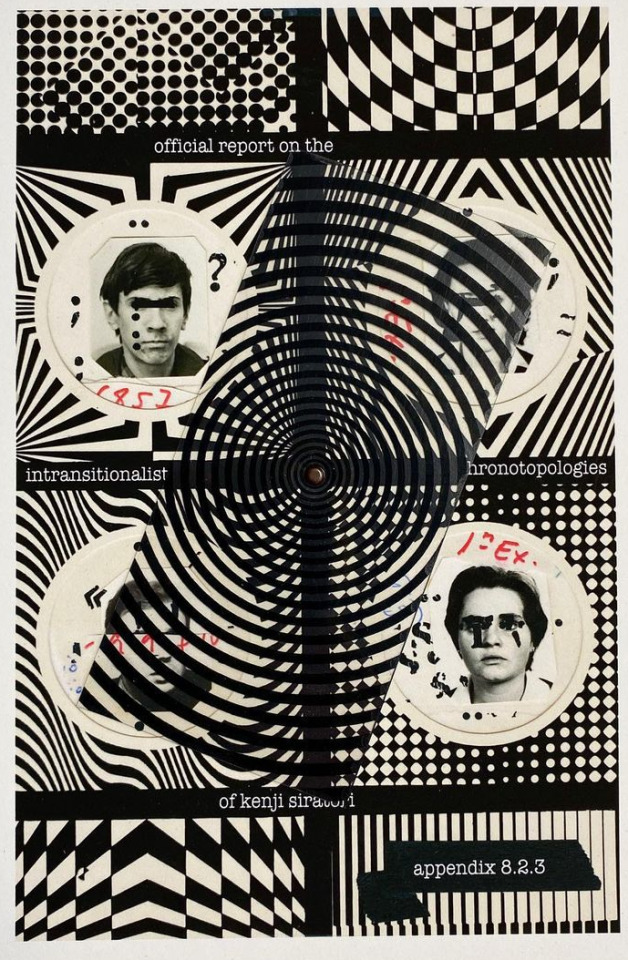
Andrew C. Wenaus "A year ago I was corresponding with the glitch writer Kenji Siratori about collaborating. We finally decided on an anthology of theory-fiction footnotes to a glitch novel (that he'd compose). Anyway, Kenji - being no longer human- pumped out a glitch novel in about 48 hours, and I started reaching out to some writers and critics who were interested in experimental art. After reaching out to about eight people, mania got the best of me, and I decided to reach out to *lots* of people. My assumption was that one out of ten people would be interested. Within 72 hours, I'd lined up over 50 contributors from various backgrounds (establishing award-winning authors/poets, experimental undergroundists, critical theorists, psychoanalysis, medical professionals, media theorist). People were into the idea after all. By December, I realized that we'd need to find a publisher. Before sending out proposals, I contacted Colin Herrick and Maria Chenut at the boutique music label Time Released Sound to see if they'd be interested doing some cover art for the project. TRS specializes in singular, unique, analogue small-run prints of music in short, Colin is an outstanding analogue artist. When I mentioned this to Colin, he loved the idea and proposed TRS as a publisher: we'd go for a standard edition with original soundtrack *and* a limited run of handmade deluxe copies. So, this wasn't at all what I had in mind when I reached out... but when Colin proposed this, I thought: a perfect idea and a great publisher to collaborate with! With Mike Corrao working with Colin to do the typeset and prepare the book for printing, about ten billion ideas were passed back and forth. We've now settled and here's the first preview of what this strange anthology will look like. It is a collision between digital Al writing and hand-crafted analogue art: a swarm of human writers writing a "footnote" to a combinatorial, algorithmic alien text. So, here's a sneak peaks of the book, OFFICIAL REPORT ON THE INTRANSITIONALIST CHRONOTOPOLOGIES OF KENJI SIRATORI: APPENDIX 8.2.3, collectively authored by the members of the top-secret agency, The Ministry of Transrational Research into Anastrophic Manifolds."
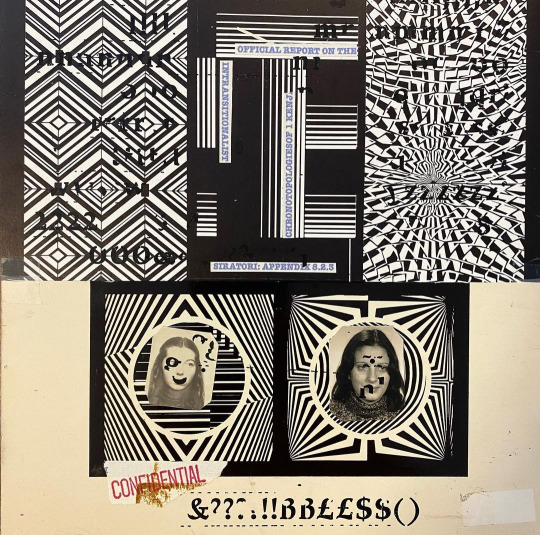
Release in this summer.
9 notes
·
View notes
Text
Alright peeps-
This post is going to focus on an obscure reason why I don’t have high expectations for the AquAka ship.
Writers intentionally do things with a purpose in mind. As a preface, we’ll use Mem-cho to establish this point. She was given a (?) next to her age when she was interviewed for Love Now and we know later on that she lied about it.
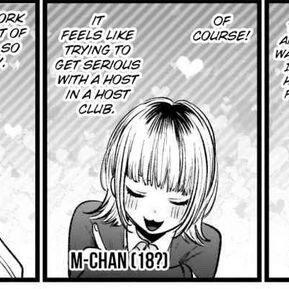
Later on when drawing the “love triangle” the arrows between the two of them go both ways and had a (?) over it. Like they both are unsure how to feel about each other.
I still firmly believe that the love triangle should have Kana as center. Go my shoujo queen!
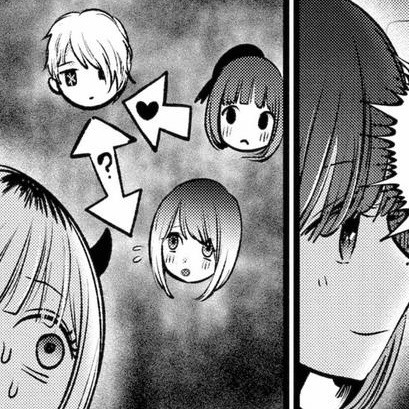
Then there’s this damning moment in Chapter 72…
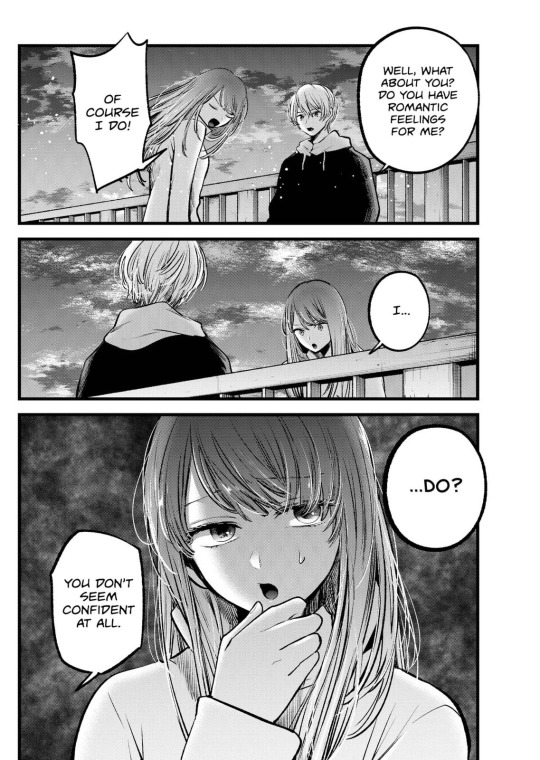
Where even she is unsure of her feelings towards him. Is it love? Is it admiration? What we do know is she cares deeply for him. Its hardly ever seen in a romantic light though.
There are many people pointing out other more realistic reasons but I’m bringing up one that is rarely ever brought up in shipping discussions. This post is essentially a (*) or footnote to a long essay.
#oshi no ko#onk#not adding the character or shipping tag for this one so they can peacefully look through their tag#photo post
7 notes
·
View notes
Text
Adrenochrome is oxidized adrenaline. When adrenaline becomes oxidized, it becomes inert. The whole QAnon Adrenochrome harvesting from children is bullshit. I've seen this conspiracy theory gain more and more traction over the years and now that the star of "Sound of Freedom" Jim Caviezel has been making the rounds on right-wing podcast, the whole "child harvesting of adrenochrome" has had a new push. The whole adrenochrome as a drug came from Hunter S. Thompson and was used in a book he wrote as a plot device.
Hunter S. Thompson mentioned adrenochrome in his 1971 book Fear and Loathing in Las Vegas. This is the likely origin of current myths surrounding this compound, because a character states that "There's only one source for this stuff ... the adrenaline glands from a living human body. It's no good if you get it out of a corpse." The adrenochrome scene also appears in the novel's film adaptation. In the DVD commentary, director Terry Gilliam admits that his and Thompson's portrayal is a fictional exaggeration. Gilliam insists that the drug is entirely fictional and seems unaware of the existence of a substance with the same name. Hunter S. Thompson also mentions adrenochrome in his book Fear and Loathing on the Campaign Trail '72. In the footnotes in chapter April, page 140, he says: "It was sometime after midnight in a ratty hotel room and my memory of the conversation is hazy, due to massive ingestion of booze, fatback, and forty cc's of adrenochrome."
In reality, adrenochrome is synthesized, solely for research purposes, by biotechnology companies.
https://pubs.acs.org/doi/10.1021/ja01129a531
https://patents.google.com/patent/US3445478A/en
https://science.howstuffworks.com/adrenochrome.htm
3 notes
·
View notes
Text
"The name of his regiment, read by the genious of war"
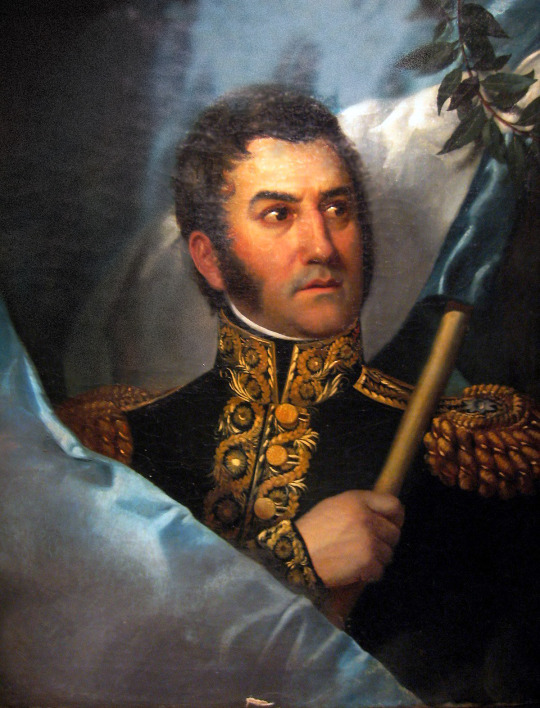

Since this blog has been receiving some attention by the Napoleonic side of Tumblr lately I decided to share an anecdote that it's probably not too known around here, which involves everyone's most/least favorite self-made emperor, and Argentina's greatest national hero. Just a heads up, the anecdote is also probably fake, but hey, it's still kinda funny.
But first a super brief biography so you know who I'm talking about. José de San Martín was born in 1778 in Misiones, current day Argentina, to Spanish parents. When he was five years old the family sailed back to Spain, where José joined the army at the ripe old age of eleven. He fought against the French during their occupation of Spain, yet in 1812 he deserted and went back to his home country to join the on-going revolution against the Spanish rule (another domino effect of Napoleon going "actually fuck these Bourbon guys my brother is king of Spain now"). There he was made general, took command of the revolutionary troops, and lead a series of succesful military campaigns that drove out the Spanish royalist forces from current day Argentina, Chile and Perú. After he passed the command to Simón Bolívar, and tired of the political divisions in Argentina, he left with his only daughter for Europe, where he lived quietly in different countries until he settled in France, where he died at the age of 72 in 1850. San Martín's role in the emancipation of South America from Spain is considered vital, and it gained him the name of "Father of the Nation" and "The Liberator" in Argentinian history.
That being said, let's go to the actual anecdote. The first mention of this story can be found in a footnote of San Martín's first biography, written by Bartolomé Mitre in 1869 and published in 1887. This allegedly happened in May 1798 when Napoleon was about to embark to his campaign in Egypt:
San Martín himself used to tell in his last years, that on one ocassion, finding himself confused in a group of Spanish officers in the presence of Napoleon, he fixed his deep gaze on him, walked up to him abruptly, and taking the button of his lieutenant's coat (that was white and light blue) he read out loud "MURCIA!" That was the name of his regiment, read by the genious of war.
San Martín, then 20-years-old, was at that time lieutenent colonel in the Regiment of Murcia but had temporarily joined to the Frigate Santa Dorotea (Spain had trouble fillling up the ranks of their navy and had resorted to recluiting army officers); that's why Mitre points out the color of his uniform, which was visibly different from the dark blue of the navy officers' uniforms.
Mitre gives no source for this story beyond "San Martín used to tell", but it may have come from San Martín's son-in-law, who send Mitre the family documents from Europe so he could write the biography. Since then it has been repeated in almost every book about the Liberator.
Personally, I think that had San Martín actually met Napoleon, even just for a few minutes, he would have mentioned this to someone during his lifetime? That the story only appears after his death (in a biography that is considered pretty outdated too, since Mitre was more preoccupied with creating a national identity for Argentina rather than making an accurate study of his subject), is pretty suspicious at least. However, to give it the benefit of the doubt, we do know for a fact that San Martín actually was in Toulon during the month of May 1798. So perhaps he at least did saw Napoleon, since they were both on the same city at the same time for some days.
I don't know enough about Napoleon to say if randomly walking up to someone and grabbing them by the coat is something that he would do, but the image of a young San Martín minding his own bussiness and suddenly this French guy (soon to be emperor) just grabs you and yells Murcia to your face is really funny to me, so as we say here, I choose to believe that it did happened.
#also if it happened i love the implication of san martín just never talking about this during the years napoleon was alive and relevant#and then forty years later in the middle of a family dinner being all like ''hey did i ever told you that napoleon yelled at me once''#btw there isn't any image of san martín in his 20s so I'm using that portrait of him instead - it's his most '''canon'' picture#general josé de san martín#napoleon i
15 notes
·
View notes
Text
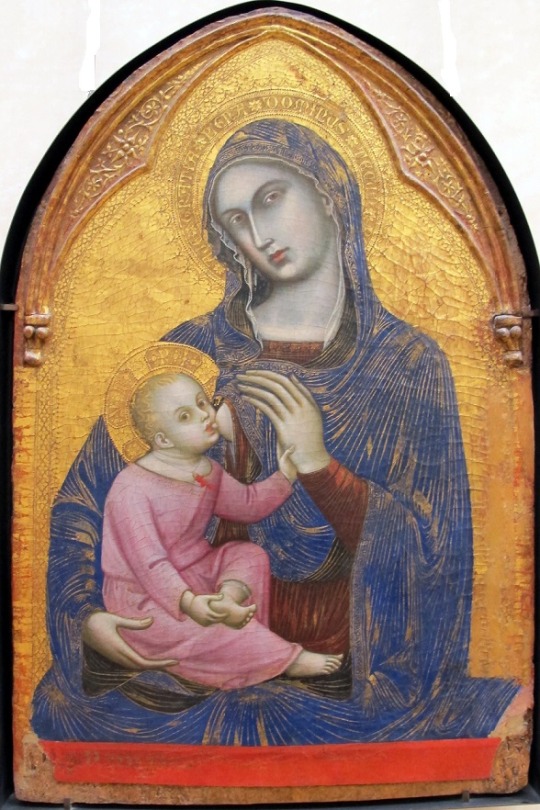
2 Religious Icons, Barnaba da Modena and Veneto-Cretan Icons of the Madonna and Child, with footnotes #27
Please follow link for full post
The Nursing Madonna, Virgo Lactans, or Madonna Lactans, is an iconography of the Madonna and Child in which the Virgin Mary is shown breastfeeding the infant Jesus. In Italian it is called the Madonna del Latte ("Madonna of milk"). It was a common type in painting until the change in atmosphere after the Council of Trent, in which it was rather discouraged by the church, at least in public contexts, on grounds of propriety…
Art,Paintings,Bible,Realism,Religion,Icons,Barnaba da Modena,biography,Cretan School,History,Madonna Lactans,Zaidan,Jesus,Mythology,Classical,Icon,footnotes,Christ,
Art #Bible #biography #History #Jesus #mythology #Paintings #religion #Saints #Zaidan #footnote #fineart #Calvary #Christ
#Art#Bible#biography#History#Jesus#mythology#Paintings#religion#Saints#Zaidan#footnote#fineart#Calvary#Christ
4 notes
·
View notes
Text
[Book Review] 🚩BID’AH HASANAH: THE MISUNDERSTOOD TERMS🚩
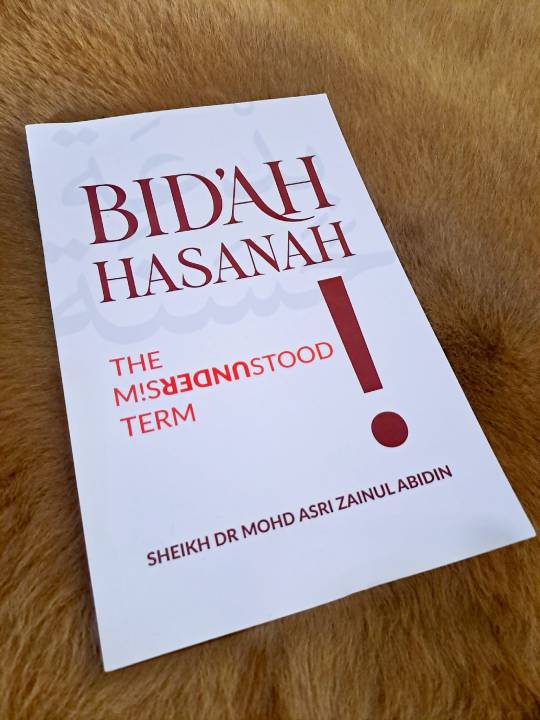

🧮Score: 3.9/5.0
.
“Moderation upon the Sunnah is better than exertion upon Bid’ah.” - page 72.
.
■ This book is also available in Bahasa Melayu. A much-needed book in our society, where most people thought Bid’ah Hasanah is a good thing and not a threat to Islamic teachings. I appreciate the existence of this book and how it is rich with footnotes and citations.
■ The author takes into account much evidence from the scholars of Mazhab Shafie to appeal to local communities.
.

■ Many examples from the lives of the sahabah and predecessors are produced, of them rejecting any good deeds that are not based on the sunnah. After all, they are the best generations to follow after Rasullullah has passed on. It also includes the opinion of famous modern scholars like Dr Yusuf al-Qadarawi.
.
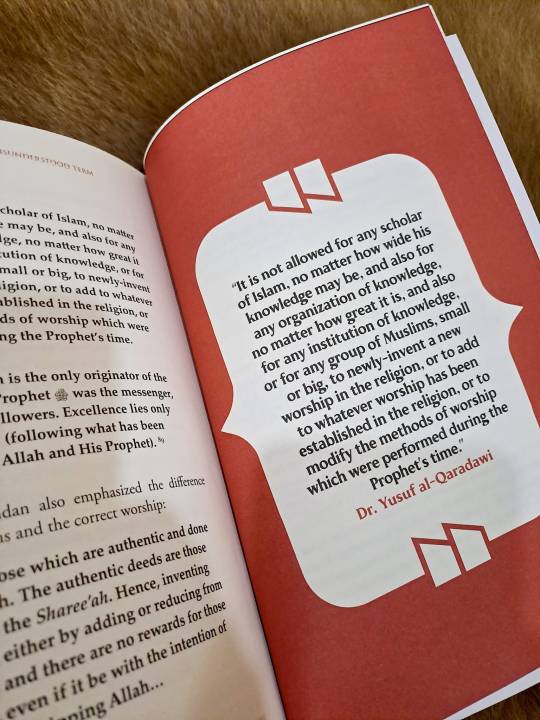
■ It seems that this book adapts the Arabic style of content structure presentation. Everything is academic and pretty straightforward. It is like a portion or a subtopic of a textbook is taken out and discussed in a smaller book. It is catered more towards knowledge seekers, not so much for leisure reading.
.
■ The writing style is almost similar to Al-Jibaly’s. Full of many useful proofs and explanations. But all are just statements. I did not feel any encouragement or interaction that may convince the readers much. It does not give the feels we get after reading books by Al-Jibaly. It is like “I’ve presented the facts, so now it is up to you to take it or not”. I
.
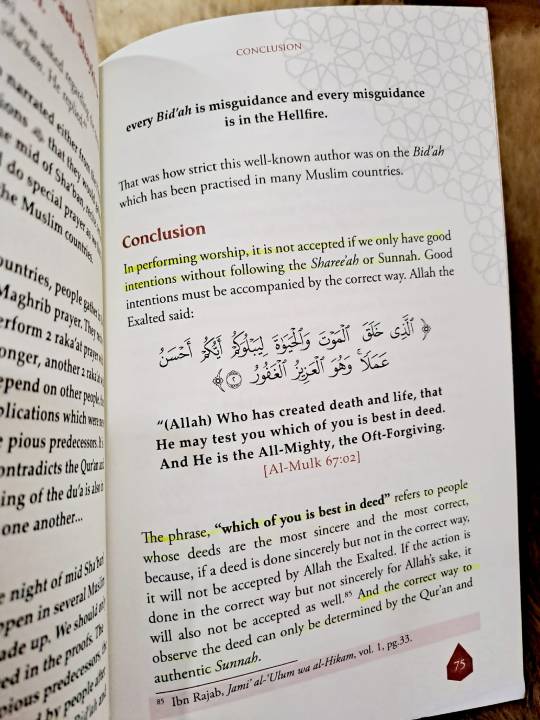
■ Overall, I would say this is a good comprehensive booklet on the bid'ah hasanah issue.
---
● Buy a used copy from:
● Buy new copies from:
#book review#islamic books#bidaah hasanah#dr MAZA#the misunderstood term#cool design#dakwah corner bookstore#DCB publication
2 notes
·
View notes
Text
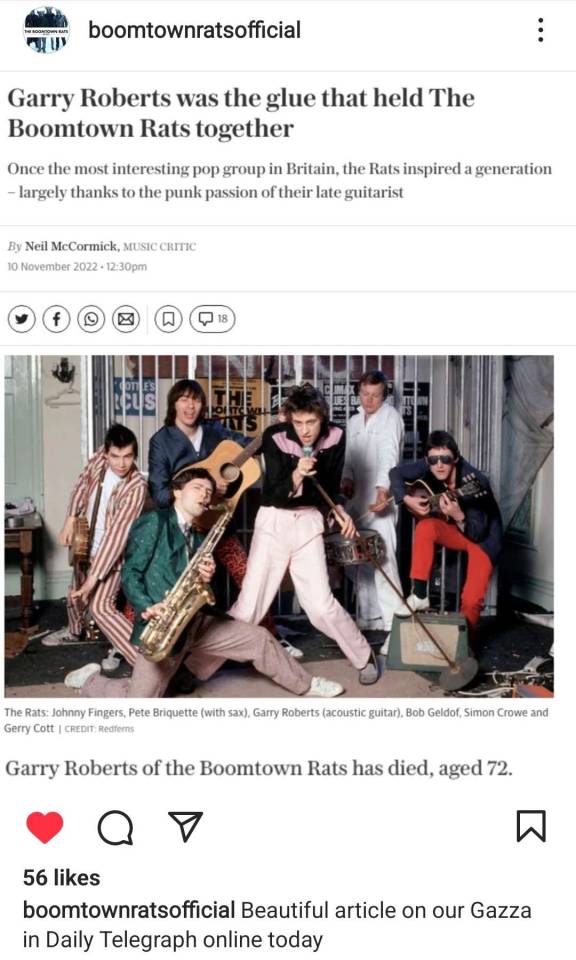
And here's the link to the full article, for anyone who wants to read it. It may be behind a paywall for some of you, so I've also copied the full text below.
Garry Roberts was the glue that held The Boomtown Rats together
Once the most interesting pop group in Britain, the Rats inspired a generation – largely thanks to the punk passion of their late guitarist
Garry Roberts of the Boomtown Rats has died, aged 72. Rock has lost another good one. “For fans he was The Legend,” the surviving band members wrote in a heartfelt statement. “For us, he was Gazzer, the guy who summed up the sense of who The Rats are.”
In a group publicly dominated by the big mouth, sharp elbows and high-wattage charisma of Sir Bob Geldof, Roberts may not have been a household name. But he was right at the centre of one of the greatest bands of the new wave era. “There was a lot of rocking going on that night” to quote the opening line of The Boomtown Rats’ 1978 number one smash, and it was Garry (with two R’s, from Garrick) who was doing the rocking, his sharp guitar playing, overdriven amps and rock’n’roll swagger helping drive the Rats all the way from heated up Irish pub rockers to international stardom.
It was Roberts who originally gathered five young musicians together in a pub in Dun Laoghaire, south Dublin, in spring of 1975, to form a band that would do far more than just become the first punks to score a UK number one single. They would go on to help transform their home country. And it was Roberts who was instrumental in their revival in recent years, convincing multi-millionaire businessman and activist Sir Bob that it was time to get back to his punk rock roots.
In recent times, The Boomtown Rats were in danger of becoming a footnote in rock history, almost totally eclipsed by the global fame of their frontman, reduced to just something Geldof did before Live Aid. Yet for a few years in the late Seventies, they had been the most interesting pop group in Britain and Ireland, scoring hit after hit with sharp-witted, punk inflected, new wave music, chock full of bright ideas, crammed with sparky hooks, and delivered in vivid, attention-grabbing style.
Between 1977 and 1980, The Rats had nine consecutive top 20 singles, including two quite extraordinary number ones. Rat Trap was a Springsteen-style shape-shifting five-minute soap operatic epic about the crushing pressures of working class life. It is an epic surpassed in their own canon by I Don’t Like Mondays, surely the only chart-topping pop song about a school shooting. The song gave them their only hit in the United States, where they were briefly touted as the next big thing before it was pulled from the radio, as programmers belatedly noticed what it was about.
The bold accompanying video was an early triumph of the pre-MTV era, casting the group as witnesses to an unfolding tragedy, the final shot featuring the Rats and a cast of school children watching the video itself. The Rats were one of the first bands to really understand and harness the power of this new visual medium, presenting themselves with a colourful comic exuberance, although often shot through with an abrasive edge of punky anger. They were never cute and cuddly, like Madness, and it was perhaps this spikiness which made them unpalatable in the long run.
There is something very shrill and in-your-face about The Rats’ run of hit singles, the aggressive selfishness of Lookin’ After No 1, the taut lechery of Mary Of The Fourth Form, the shrieking, sneering satire of She’s So Modern, even the mechanical alienation of Like Clockwork. As they became established fixtures of the charts, they tried to soften their sharp edges with thicker keyboard lines and Geldof’s voice lower in the mix. But that underlying abrasiveness is still present in the snarling paranoia of Always Someone Looking At You, the poisonous character study Diamond Smiles, and bitter sentiments of their last top 10 hit, 1980 reggae satire Banana Republic that mocked the parochial politics of their home country, and was banned in Ireland as a result.
This quality of aggressive, attention-demanding neediness certainly came from Geldof, the archetypal rock star with a chip on his shoulder. It was a crucial element in helping them break out of an Irish music scene characterised by a sense of inferiority and inadequacy. But the Rats were always a pack, and from the very beginning Roberts was a true believer in the notion that a group from Ireland could compete with the best. While Northern Ireland’s Van Morrison was a legend, and Thin Lizzy had made inroads, The Boomtown Rats were the first ever Irish band to reach number one in the UK.
The impact that had on their home country is impossible to understate. As someone growing up in Dublin in the Seventies, the Rats made you feel it was possible to escape the confines of what was then the poorest country in the European Union, and to demand to be treated as an equal by the cool cats at the centre of the pop culture world in England. It was the first lonely roar of the Celtic Tiger, and it opened the door for so many others. As U2 front man Bono has said, his own group rose up in “a post-Geldof world where you can hustle and hassle for a place at the top of the queue. It was climbing Mount Everest by helicopter.”
It may well be that Geldof’s talents for quick thinking, organisation, fearless promotion and passionate action were, in the end, better suited to other things. It is a little remembered fact that all of the Boomtown Rats play on The Band Aid single Do They Know it’s Christmas?. They were fully supportive of Geldof’s passionate charity endeavours. But the world-changing success of Live Aid propelled the frontman into a whole new area, and the group broke up the next year.
Afterwards, Roberts worked as a sound engineer before hanging up his guitar for over a decade. “When the band broke up,” Roberts has said, “I think I suffered from post traumatic stress disorder, and as a result I think I became intolerable. And then I had to pull myself together.” He worked as a life insurance salesman in Ireland, then (disillusioned with the business) qualified as a central heating operator. One can just imagine the bemused conversations as one of Ireland’s leading veteran rock stars turned up at households to fix faulty pipes.
But Roberts had also started playing again by the late Nineties, often with Rats drummer Simon Crowe, with whom he formed a formidable rhythm section. Always a rocker at heart, still sporting Elvis sideburns, a leather jacket and riding a motorcycle, Roberts “developed a plan to get the band back together.” In 2013, to his great joy, he succeeded, persuading Geldof and two other founding members (Crowe and bassist Pete Briquette) that it was time to do the Rat again.
They released a suitably trashy, punky new album in Citizens of Boomtown in 2020, and Roberts can be seen talking with pride about their revival in a punchy, moving documentary of the same name. I am in that documentary too, paying tribute to a band who really made an impact on my life. I spoke to Roberts after the cinema premiere in Dublin. He thanked me for the kind words. I thanked him for the amazing records, the glorious solos, and providing an inspiration to my whole Irish generation. He changed my life. I don’t really have enough kind words for that.
Anyone lucky enough to have caught one of their recent tours will understand why the Rats made the impact they did. I last saw them in the Palladium last year. For a bunch of grizzly old punks, they never once took their foot from the peddle, with Roberts swaggering about, blasting out guitar lines with fuzzed up joy.
It was clear the old gang had rediscovered the utter thrill of playing tautly drilled music with like-minded friends, and the loyal old crowd was on their feet from the beginning, singing along lustily, and generally behaving in ways that made the Palladium feel less like an august theatrical emporium than a dingy old basement club in 1977. There was a lot of rocking going on that night, to put it mildly. Bob Geldof self-mockingly introduced them as “the greatest rock and roll band in the world … from Dun Laoghaire.” That is a title no one is ever going to take away.
#garry roberts#the boomtown rats#boomtown rats#ratsofficial#garry#that little 'our gazza' in the caption has broken me I'm ngl
5 notes
·
View notes
Note
For the fanfiction asks
1, 2, 12, 21, 23, 27, 51, 72, 73, 78,
Thanks for the asks! This ended up being long, so I put it under a read more.
1: I do a whole lot of daydreaming, and I don't usually put anything to paper unless I get really inspired, or until things are concrete enough in my mind. Not to mention, I don't always have access to the way that I write, so daydreaming is my main way of keeping things in mind before writing.
2: Honestly, a good majority of the ways that I come up with Zelda fics is the thought process of 'haha it would be fun to put linebeck in this situation', for the recent oneshots, it's more wanting to practice and expand on how I write him and other certain things. I have a few crossover aus in mind, and those are usually a mixture of 'I really like this piece of media' and the usual 'haha linebeck in fun situations'. Honestly, linebeck is the main driving force for my Zelda ideas. But for non-Zelda ideas, I usually need room for creating my own story within a set story; for example, the Warrior Cats world has plenty of room for me to create my own characters and stories. But overall it's the loose string of 'hey this would be cool' that very quickly becomes it's own thing.
12: Most of my older stuff was just planned straight out of my mind, but recently, I've been planning out future projects in ways that fit said projects (a calendar for post-ph, an excel document for a convoluted fic, and simple footnotes for a shorter five-chapter fic). Oneshots and less complicated ideas usually just stay in my mind. More emotionally-driven or abstract ideas will also just stay in my mind (vent fics, a horror idea I'm considering). I'm not strict about planning, but it keeps things coherent. Detail also varies; for example, the fic outlined with excel requires more detail than post-ph. I tend to stray in small details, but try to stick to the big story beats.
21: Overall, I'll say multi-chapter. I get more time and space to linger on worlds and ideas and characters, and I can practice with longer character arcs and writing tools and stuff, and my more wild ideas are easier to pull off when they're longer.
23: Writing beginnings of anything is hell for me. Endings are similarly difficult, but it's a lot harder to smoothly get into something rather than transition out. The middle is easiest; things are already flowing, and while it can get hard, I don't have to worry about big introductions or setting the scene.
27: Dialogue. I've gotten compliments on my dialogue, and I'm very particular about dialogue in bother things I write and things I watch or read; it's very easy to pick out 'bad' or unnatural dialogue. I don't have trouble making dialogue between characters seem natural, but exposition is tricky.
51: A bit. When I write, I'll try most any genre since I consider it a test of my abilities, if I can handle writing within that specific genre. I usually reread old books and stick within fantasy or related genres, so there is a fair bit of disconnect between what I read and write. Even with in the sphere of fanfiction; I write a lot of Phantom Hourglass fanfiction, but I don't actually do a whole lot of reading when it comes to new stuff.
72: I don't really think I have a specific compliment that's my favorite... I'll take any compliment, really, but I guess it's just nice to see if people like my stuff or not.
73: I'm not sure about this one, mainly since I didn't get many varied readers before joining Tumblr, and even now it's still limited... But I think even outside of fanfiction, I get the most compliments on my literal writing? Not story or character of dialogue, just... stuff being well-written, like well-phrased or something. Specifically in fanfiction, though, I think I've gotten the most compliments about my portrayals of characters, mainly in my recently ph oneshots.
78: It's half wanting to see my ideas fully-fledged and to write about my favorite characters, and half hoping that people like what I write; since I started writing fanfiction, there's always been the desire to write for a fandom that doesn't get a lot of fanfiction, so part of my motivation is hoping that there might be someone who's been looking for something that I write. It's definitely a 'if you want something done right, do it yourself' kind of deal, since ph fanfiction is generally rare, and I decided to quit waiting and start writing for myself and whoever else wants it. And, yeah, the feeling of solidifying my ideas. It's just fun to write, even if it gets rough.
#asks#zeldanamikaze#salty talks#sorry this took a while i had some trouble with the ones about compliments#its cool and all to provide for a smaller fandom with less stuff#but the lack of interaction kinda sucks sometimes? esp since i joined tumblr specifically to make it easier for ppl here to find my stuff#and yeah tbh? i read ph fanfiction and stuff but ive become wary of new ph or linebeck stuff#im really specific/sensitive abt ph and linebeck so its not hard to stuff to rub me the wrong way tbh#thanks for the asks! it was fun to reflect on my writing and how i go about doing it#and yeah dialogue. im not great socially so im nervous about how i talk and stuff so i think im just more likely to notice when its weird#also. about how i get compliments on my writing in general.#best way i can explain it is that when writing essays i sometimes lose sight of the prompt or whatever but the writing itself stays solid#like i think ive gotten that sophistication point thing before. but i can also be robotic if im aware there's a 'right' way to write smth#im rambling too much thanks for the asks and i hope youve been doing well#i might be repeating myself on this???? but if you wanna just shoot asks just to discuss or ask abt anything thats cool#ive been rbing ask game things since i get limited interaction but i just want ppl to know that i wouldnt mind ppl sending asks abt media?#like if you wanna discuss a game or some writing or whatever. thatd be fine
2 notes
·
View notes
Text
Alleged Contradictions: #9
Do Christians go to Heaven or Hell?
a. Christians shall enter Paradise (2:62, 5:69)
b. Christians shall go to Hell (5:72, 3:85)
2:62: Indeed, the believers, Jews, Christians, and Sabians---whoever truly believes in God and the Last Day and does good will have their reward with their Lord. And there will be no fear for them, nor will they grieve.
5:69: Indeed, the believers, Jews, Sabians and Christians---whoever truly believes in God and the Last Day and does good, there will be no fear for them, nor will they grieve.
5:72: Those who say, "God is the Messiah, son of Mary," have certainly fallen into disbelief. The Messiah himself said, "O Children of Israel! Worship God---my Lord and your Lord. " Whoever associates others with God in worship will surely be forbidden Paradise by God. Their home will be the Fire. And the wrongdoers will have no helpers.
3:85: Whoever seeks a way other than Islam, it will never be accepted from them, and in the Hereafter they will be among the losers.
Footnotes(s) for 2:62:
"22: The Sabians are an indigenous group that believes in a supreme being and lives mostly in Iraq.
23: This verse should be understood in light of 3:19 and 3:85. For more details, see the Introduction."
Footnote(s) for 5:69:
"251: See footnote for 2:62."
Footnote(s) for 3:85:
"142: i.e., full submission to the will of God."
Full submission to the Will of God (Islam) requires acknowledging God as God, and God alone. That means no partners or offspring, as also stated in the Quran. This seems to take the wind out of Christianity's sails, since the core tenet (to the best of my memory) treats Jesus as the Son of God, who was sent to spread the Word until the day of his crucifixion. Then came his resurrection and ascendancy three days later. The only thing I can think of, that could send a Christian to Paradise while keeping a belief in Jesus, is if they didn't tout him as God or God's son. If they know and believe he existed, and that he returned to God without needing to be crucified (enter: the imposter implanted for death, by God), then that would make them supplicants to God. But even then, if the core idea of Christianity revolves around Jesus dying for our sins, as an outreach of God through divine paternity and identity, wouldn't that send them to Hell? Maybe if they just pray to God, and not Jesus, they'd be saved?
In the Introduction, it says that, "Muslims believe that Jesus is the Christ and the Messiah. They also believe in his virgin birth, ascension, and second coming." The titles of "Christ" and "Messiah" make Jesus out to be a leader/savior to a group of people, and as one anointed by God. With all this taken into consideration, it seems Christians can go to Paradise, as long as they don't place Jesus in a role other than those given by God (prophet, anointed one, etc.) and don't' associate him with God in worship. Then again, who am I to case judgment? To the best of my understanding, there is no contradiction here.
0 notes